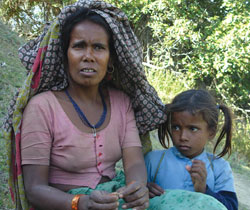|
|
"These were my parents," says eight-year-old Rajan BK holding out a much-handled photograph. His mother and father, both of whom had full blown AIDS, died last year. Rajan doesn't speak for the rest of the day. He carries the photograph everywhere.
"It's incredibly hard for us all. I can't bear the pain of losing my only son," says Rajan's grandfather, 67-year old Prasa, who now has to do hard physical labour to feed and school his three grandchildren. "My son made a mistake and now his old parents and children suffer. This is a terrible fate," he adds.
In 2005/06 alone, nearly a fifth of 500 people who came in for a blood test at the local Voluntary Counselling and Testing Centre (VCT) in Sanphebagar were found to have the virus. Local ngos estimate that close to 500 people have died here of HIV/AIDS related illnesses in the last three years.
AIDS-related death is nothing new in Ridikot VDC, an impoverished dalit area 2km from Sanphebagar in Accham. But as the number of orphans and widows here grows, so does the dire economic hardship and social ostracism they have to endure.
There are close to 20 AIDS orphans in this single ward of Kakadset village. In nearby Payal VDC, there are over 115, mostly dalit. The lucky children whose relatives have enough farmland or income can stay on in the family home. Most must find work wherever they can, in the district or outside, as domestic workers, porters, and farm labourers.
Most of the surviving widows were infected with HIV by their husbands. The majority of men in Achham go to work in Mumbai as porters and guards-every adult male from Kakadset ward's 30 households has done so-and all are at high risk for HIV from unprotected sex in Mumbai's Nepali brothels.
"They go with dreams of becoming rich, but come back with HIV. Their poor families become even poorer," says an angry 17-year-old Netra BK, who is worried about his brother and father who both work in Mumbai.
"As much as the extreme poverty, the psychological and social hardships can also be unbearable for the children and widows," explains Haribol Bajgain from Save the Children (Norway), which works with local ngos to help the local community reduce the impact of AIDS on vulnerable groups.
Suicide attempts are becoming increasingly common here among those infected with HIV and who deal with its fallout. "Death seems better than living with such misery," says 33-year-old widow Mansara Bhul, who has HIV. Bhul tried to immolate herself and her three children earlier this year. The family was saved by a neighbour who heard the children screaming.
Bhul and her children had to live under a tree for some months after her relatives kicked her out of her house when her husband died of AIDS. Things are a little better now, but only because she receives financial support towards monthly expenses and her children's education from Gangotri Rural Development Forum, a local ngo, and SCF (Norway).
Healthcare in Achham is appalling. There are a handful of nurses for the district's 250,000 residents. The health posts are poorly stocked-they often run out of diarrhoea medication during the monsoon. Anti-retroviral treatment is a distant dream. "About a hundred people with HIV come to us every week asking for ARV treatment but all we can do is refer them to hospitals in the cities," said Krishna Rawal from Himalayan Association Against AIDS, which runs the blood testing clinic.
Most people with HIV here will die from secondary infections, such as acute respiratory problems, cholera, asthma, typhoid, and urinary tract infections. For women the situation is complicated by the high prevalence of uterine prolapse. "I am just waiting to die," says 32-year-old Kokila Bista, who has had a prolapsed uterus for over a year. Because she has HIV, doctors in Kathmandu and Mumbai do not want to operate for fear of virus-related complications.
Despite the hardship, the stigma and the neglect, some of Achham's HIV widows have started to band together to form support groups called Ekal Mahila (Single Women) with the help of Gangotri, SCF (Norway), and Social Volunteers Against AIDS. The 20 groups in 20 VDCs now have close to 200 members who work together to earn money through vegetable farming and calf and poultry farming. The income goes to help feed their children and, if there is anything left over, travel to city hospitals for treatment.
For the time being, it looks like all they are likely to have.



